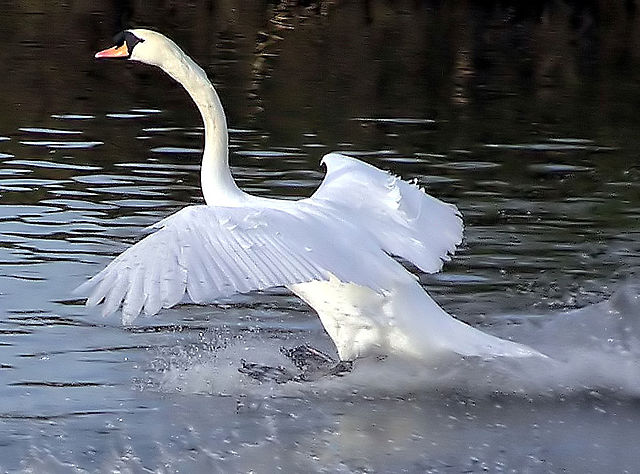Exeter Riddle 7
MEGANCAVELL
Date: Fri 17 May 2013Matching Commentaries: Commentary for Exeter Riddle 7
This week’s translation is a guest post from the wonderful Jessica Lockhart. Jessica is a PhD candidate at the Centre for Medieval Studies, University of Toronto, and she clearly knows a thing or two about stylish translating. Stay tuned next week for her commentary.
Hrægl min swigað, þonne ic hrusan trede,
oþþe þa wic buge, oþþe wado drefe.
Hwilum mec ahebbað ofer hæleþa byht
hyrste mine, ond þeos hea lyft,
5 ond mec þonne wide wolcna strengu
ofer folc byreð. Frætwe mine
swogað hlude ond swinsiað,
torhte singað, þonne ic getenge ne beom
flode ond foldan, ferende gæst.
My clothing keeps quiet, when I step on earth
or settle down on dwellings or disturb the waters.
Sometimes my dress and this lofty air
lift me over the home of heroes;
5 and widely, then, does the clouds’ strength
bear me over mankind. My adornments
sound out loud and entune sweetly,
sing clearly, when I am not touching
flood and fold, a soul faring.
Notes:
This riddle appears on folio 103r of The Exeter Book.
The above Old English text is based on this edition: Elliott van Kirk Dobbie and George Philip Krapp, eds, The Exeter Book, Anglo-Saxon Poetic Records 3 (New York: Columbia University Press, 1936), pages 184-5.
Note that this edition numbers the text Riddle 5: Craig Williamson, ed., The Old English Riddles of the Exeter Book (Chapel Hill: University of North Carolina Press, 1977), page 72.
Tags: anglo saxon exeter book riddles old english solutions riddle 7
Related Posts:
Commentary for Exeter Riddle 73
Exeter Riddle 3
Exeter Riddle 40

Commentary for Exeter Riddle 6
MATTHIASAMMON
Date: Mon 06 May 2013Matching Riddle: Exeter Riddle 6
As we have already seen with the other riddles, the poet here employs language familiar from other contexts to show the sun in a new light (if you’ll excuse the pun). In Riddle 5, elegiac exile imagery was transferred to an object intimately associated with the social world of heroic poetry; here, a part of the natural world is described as a warlike thing. Again, the language of the relationship between a lord and his follower is evoked. The emphasis on Christ as commanding the sun also serves to set this riddle very much in a Christian context. This coming together of heroic imagery and Christian themes is something that is quite common in Old English poetry. In this case, for example, some scholars have argued that the dual nature of the sun, which is sometimes pleasant and sometimes painful, reflects the nature of Christ himself – his "warmth" is pleasant to faithful believers and painful to sinners. There is thus a metaphorical focus within the poem that raises it beyond the playful description of a natural object, which is something worth bearing in mind when reading the riddles in general. At any rate, I’m sure we can agree that the riddle shows a certain early medieval ambiguity about the sun (which some might say has persisted up to the present day).
In the manuscript, the text of the riddle is followed by a single rune, usually taken as representing the letter "s" and standing for Old English sigel or possibly Latin sol. Both of these words mean "sun," so the rune might be a further hint towards the solution of the riddle. We will come back to runes with some of the other riddles.
Photo (by Jessie Eastland) from Wikimedia Commons (licence: CC BY-SA 3.0).
Related Posts:
Commentary for Exeter Riddle 6